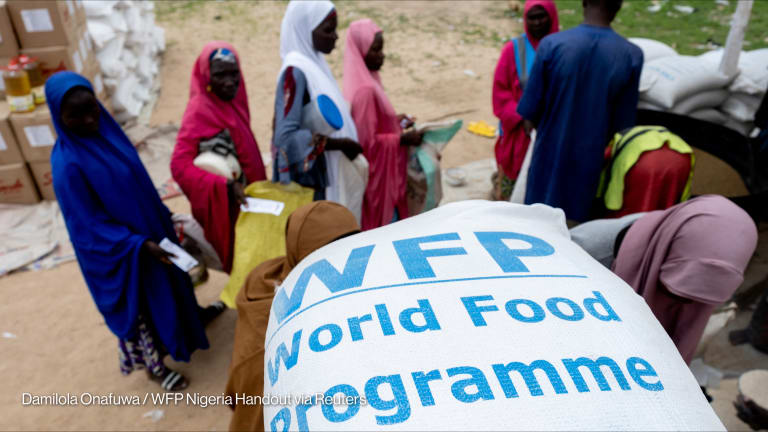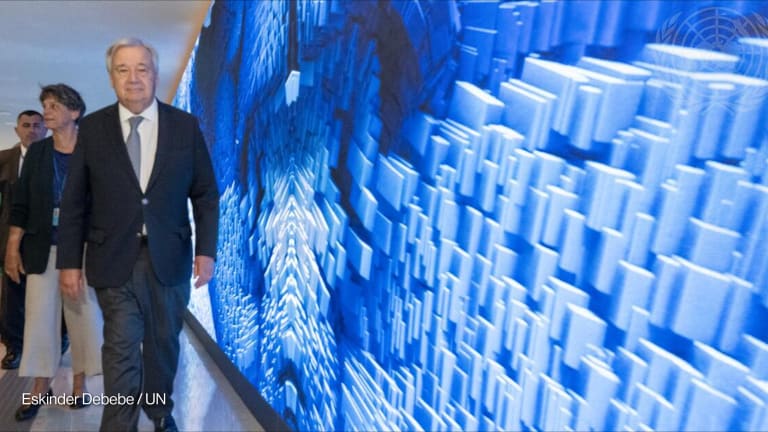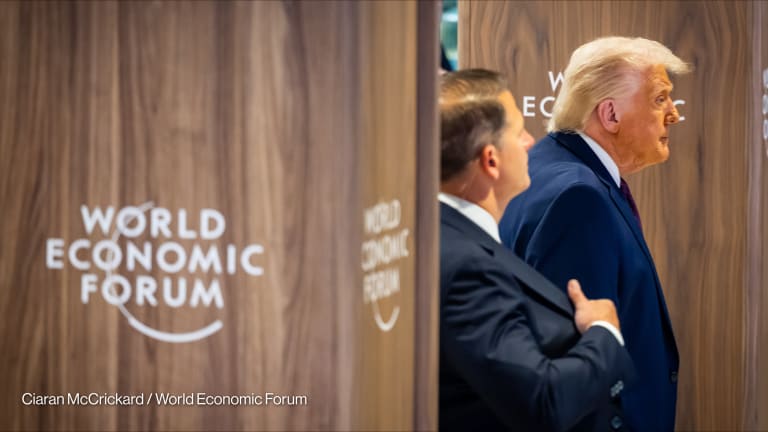Innovation at WFP: A safe space combined with scale
Enrica Porcari, director of technology at the World Food Programme and chair of the Emergency Telecommunications Cluster, talks to Devex about pathways for technologies to deliver real outcomes in humanitarian assistance.
HALF MOON BAY, Calif. — When refugees at the Zaatari refugee camp in Jordan check out of the supermarket, they do not pay for groceries with cash or credit card, but instead use a service called “Building Blocks.” “The world is moving too fast for us to be steadfastly bolted into our comfort zones.” --— Enrica Porcari, director of technology, WFP They walk up to an iris scanner at the checkout counter, which confirms their identity on a United Nations database and settles the bill, after it checks that money is available on their account from the World Food Programme, the food assistance branch of the U.N. Building Blocks operates on the blockchain — a decentralized system of record keeping — and by the end of this year, the program is expected to reach all 500,000 Syrian refugees in Jordan. What began as an idea at the WFP Innovation Accelerator in Munich, Germany, has expanded into Jordan. Next, Building Blocks will move into Bangladesh, said Enrica Porcari, director of technology at WFP, who has since brought the creator of the program under her team. This is just one example of how an innovation strategy can bring emerging technology to the humanitarian space. “Innovation is continuing to challenge the status quo, and not being content with what you have, but saying, ‘I can do this better,’” Porcari said in an interview. “It’s the safe space combined with the scale that makes this work.” Porcari is the principal adviser to senior management at WFP in the field of information technology and systems. She is responsible for developing, managing, and overseeing WFP’s digital technology strategy across its operations. Porcari also serves as chair of the Emergency Telecommunications Cluster, a global network of organizations working to provide shared communications services within 48 hours of a disaster. “It’s sometimes scary,” Porcari said of efforts by WFP and its partners at ETC to bring technology into humanitarian work. “But it’s scarier not to do it. Because you can become irrelevant. The world is moving too fast for us to be steadfastly bolted into our comfort zones.” WFP has long recognized that an organization is only as innovative as its employees, but more recently, it has made changes to reflect that. In 2016, WFP launched its Munich innovation accelerator, which puts on challenges, hosts bootcamps, and runs sprint programs to support individual entrepreneurs or teams of innovators working on ideas to end hunger. It allows ideas to be piloted no matter where they come from inside the organization. “Success means that we’re able to deploy these innovations into as many possible countries as we can.” --— One of the participants in the accelerator was Houman Haddad, who formerly worked at the treasury department at WFP headquarters in Rome, Italy. He began to wonder how the organization might use blockchain for its work in cash transfers, and spent two weeks at the WFP Innovation Accelerator, where he learned about concepts such as design thinking and the “lean startup” methodology, and applied them to his project — Building Blocks. He now works with Porcari and her team, helping them consider blockchain use cases beyond cash transfers, including identity management and supply chains. “Through blockchain, we aim to cut payment costs, better protect beneficiary data, control financial risks, and respond more rapidly in the wake of emergencies,” said Robert Opp, WFP’s director of innovation and change, in a past interview with Devex. Opp and Porcari work closely together to bring technologies from pilot to scale. “When we feel that an idea is ready, the handshake with the technology division happens, and we move it to the field,” Porcari said. “Success means that we’re able to deploy these innovations into as many possible countries as we can.” Recently, the WFP alumni network published a report on experiences of WFP staff in the accelerator. It outlines progress in areas including leveraging mobile phone technology to assess needs and provide food assistance, making unmanned aerial vehicles — or drones — mainstream in WFP operations, and introducing digital cash-based transfer programs so people can buy what they need when they need it. But there are also reminders that innovation is about more than just technology, so in addition to supporting new ideas, WFP works to bring innovation to processes that have been in place by a long time. “Over the past four decades, creative minds at WFP have worked together on innovations in programs, delivery systems, and even in back office processes to make WFP more efficient and effective,” says WFP executive director David Beasley in the alumni report. Porcari also expanded beyond technology to highlight how essential partnerships are to WFP’s innovation strategy. She recently joined Heather Johnson, vice president of sustainability and corporate responsibility at multinational telecommunications company Ericsson, at the Techonomy’s 2018 conference in Half Moon Bay, California. Porcari talked about how humanitarian organizations have a lot to offer companies, both when it comes to trying out their technologies in markets they might not otherwise reach, and providing their employees with a greater sense of purpose. “Choose partners aligned with your thinking,” she said. “Avoid disaster tourism.” While WFP prioritizes innovation, it is ultimately made up of humanitarians, not technologists, which is part of why partnerships are critical, Porcari added.
HALF MOON BAY, Calif. — When refugees at the Zaatari refugee camp in Jordan check out of the supermarket, they do not pay for groceries with cash or credit card, but instead use a service called “Building Blocks.”
They walk up to an iris scanner at the checkout counter, which confirms their identity on a United Nations database and settles the bill, after it checks that money is available on their account from the World Food Programme, the food assistance branch of the U.N.
Building Blocks operates on the blockchain — a decentralized system of record keeping — and by the end of this year, the program is expected to reach all 500,000 Syrian refugees in Jordan.
This story is forDevex Promembers
Unlock this story now with a 15-day free trial of Devex Pro.
With a Devex Pro subscription you'll get access to deeper analysis and exclusive insights from our reporters and analysts.
Start my free trialRequest a group subscription Printing articles to share with others is a breach of our terms and conditions and copyright policy. Please use the sharing options on the left side of the article. Devex Pro members may share up to 10 articles per month using the Pro share tool ( ).
Catherine Cheney is the Senior Editor for Special Coverage at Devex. She leads the editorial vision of Devex’s news events and editorial coverage of key moments on the global development calendar. Catherine joined Devex as a reporter, focusing on technology and innovation in making progress on the Sustainable Development Goals. Prior to joining Devex, Catherine earned her bachelor’s and master’s degrees from Yale University, and worked as a web producer for POLITICO, a reporter for World Politics Review, and special projects editor at NationSwell. She has reported domestically and internationally for outlets including The Atlantic and the Washington Post. Catherine also works for the Solutions Journalism Network, a non profit organization that supports journalists and news organizations to report on responses to problems.








